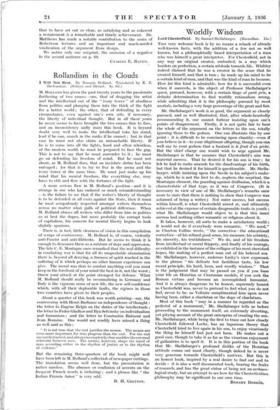Worldly Wisdom Lord Chesterfield. By Samuel Shellabarger. (Macmillan. 15s.) Tins
very welcome book is by no means a rehash of already well-known facts, with the addition of a few not so well known, but a philosophically based interpretation of a man who was himself a great interpreter. For Chesterfield, not in any way an original creator, embodied, in a way which borders on perfection, a certain attitude towards life. Whibley indeed claimed that he was a creator in the sense that he created himself, and that is true ; he made up his mind to be a certain kind of man, and that was the kind of man he became. How far this kind is admirable, how far it is successful even when it succeeds, is the object of Professor Shellabarger's quest, pursued, however, with a certain tinge of path pris, a definite determination to find worldly rationalism wrong, while admitting that it is the philosophy pursued by most mortals, including a very large percentage of the great and fair.
Mr. Shellabarger's work is so good, the argument so closely
pursued, and so well illustrated, that, after whole-heartedly recommending it, one cannot forbear insisting upon one's points of disagreement. Firstly, it is not quite fair to base the whole of the argument on the letters to the son, totally ignoring those to the godson. One can illustrate this by one point : it is difficult to be convincing upon chastity—even if you believe in it—to your illegitimate offspring, though you can well say to your godson that a bastard is le fruit d'un pechi. But the chief charge one would wish to urge against Mr. Shellabarger is that he assumes that Chesterfield's aim was material success. That he desired it for his son is true ; he felt he had to make amends for the disadvantage of his birth, but that he desired it for himself is questionable. Mr. Shelia- barger, while insisting upon the Savile in his subject's make- up, which he is not the first to do, neglects the sceptical, the Montaigne element, the guarding against disillusion, which is a characteristic of that type, as it was of Congreve. (It is necessary in view of one of Mr. Shellabarger's remarks once more to state that there is nothing to show that Congreve was ashamed of being a writer.) Not outer success, but success within himself, is what Chesterfield aimed at, and ultimately achieved at the expense of certain disagreeable traits in youth ; what Mr. Shellabarger would object to is that this inner
success had nothing either romantic or religious about it. .
It takes, however, all sorts to make a satisfactory world : it would not do if everybody were romantic. "We need," as Churton Collins wrote, "the corrective—the educational corrective—of his refined good sense, his measure, his sobriety, his sincerity, his truthfulness." We do, and of his freedom from intellectual or moral frippery, and finally of his courage, as exhibited in the instance of the collapse of his most cherished hopes, the making of a perfect man out of his beloved son Mr. Shellabarger, however, endorses Lecky's view expresse& in the phrase "his delicate but fastidious taste, his low moral principle, his hard, keen, and wordly wisdom." That is the judgement that may be passed on you if you base your life on Horatian or Ciceronian models, if you seek the Roman virtues and become an accomplished humanist. And it is always dangerous to be honest, supremely honest as Chesterfield was, never to pretend to feel what you do not feel, never to be, as Voltaire complimented him upon never having been, either a charlatan or the dupe of charlatans.
Most of this book "may in a manner be regarded as the pedestal of a monument," Mr. Shellabarger tells us before proceeding to the monument itself, an extremely diverting, yet pitying account of the great enterprise of creating the son. Mr. Shellabarger, while being the first to trace out how closely. Chesterfield followed Locke, has an ingenious theory that Chesterfield tried to live again in his son, to enjoy vicariously the thing he himself had just not been. He makes out a good case, though to take it as far as the vicarious enjoyment of gallantries is to spoil it. It is in this portion of the book that Mr. Shellabarger's profound dislike of the Horatian attitude comes out most clearly, though indeed he is never very generous towards Chesterfield's motives. But this is an honest book, inspired by a real desire to find out and to decide : it is also a well documented book, bearing the fruits of research, and has the great virtue of being not an archaeo-
logical study, but an attempt to see how far the Chesterfieldian philosophy may be,significant to our own time.
BONAMY DODDER.










































 Previous page
Previous page